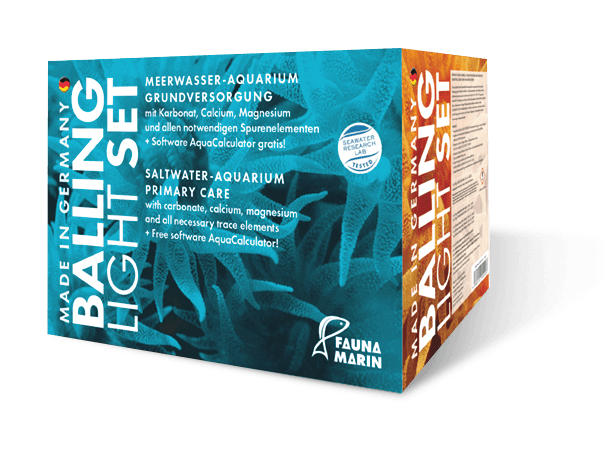Strontium
Strontium is one of the most exciting and interesting macro elements in reef aquaria and is still completely underestimated in its function.
What’s that:
Strontium, like calcium, is an alkaline earth metal and an important macro element in seawater. Strontium is not considered essential. Nevertheless it has important functions in reef aquaria and should always be kept at the reference value of 7–10 mg/l (0,26 US.liq.gal.).
Problems:
Too low strontium levels lead to loss of colour and growth, especially in corallin algae and stony corals. Strontium is also important for the health of corals.
Measures:
Regular control of the strontium value, observance of the salinity line, partial water change with Fauna Marin Professional Sea Salt as well as dosing via Elementals Sr. Strontium can be added in proportion to the calcium consumption. Strontium is the key element in the Balling Light Trace 1 solution.
Indicator species:
Too low strontium concentrations lead to pale colors, especially the loss of blue coloration, as well as poor growth and sometimes soft skeleton.
Value too high:
Reduce addition dosage, partial water change, avoid values above 12 mg/l (0,26 US.liq.gal.)
Value too low:
Dosing Elementals Sr , Increase dosing quantity Trace 1.
| Variety | Metall |
|---|---|
| Standard value | 8 mg/l (0,26 US.liq.gal.) |
| Skill Level | Red, only for experienced aquarists |
| Source | salt, supply systems trace element mixtures |
| Available | Elementals V, Balling-Light-System, Feed |
| Importance 1–6 | 2 |
| Detection quality | safe |
| Relation values | Calcium, fluoride, alkalinity |

Balling Light:
If values are too low, increase the dosings via trace 1 in canister 1 (calcium), adjust the existing dosing (difference value 10 %), increase or reduce the existing dosing by 10 %.
Natural seawater contains strontium at approx. 8 mg/l (0,26 US.liq.gal.). No known physiological significance is given for strontium in current literature. In the aquarium itself, however, strontium values that are too low can certainly be detected. On the one hand, strontium is deposited in the calcification of hard and soft corals in the calcarous skeleton, and on the other hand strontium reacts as alkaline earth metal together with carbonate to form sparingly soluble strontium carbonate. Chemical precipitation is therefore possible with incorrectly adjusted values.
Through our long experience in coral propagation and many experiments, we found out that strontium plays a much more important role for the growth and health of corals than previously thought. Corals use strontium to coat the skeleton in order to regulate growth in certain areas.
Likewise, certain colours such as blue are significantly enhanced by strontium. In combination with organic active ingredients, strontium inclusions lead to a more stable and harder skeleton and a natural growth pattern with metallic shiny tissue. The incorporation of strontium into the coral skeleton is therefore no coincidence.
The consumption of strontium is usually based on the calcium consumption and can therefore be dosed appropriately via the Balling Light System. The dosing quantity depends on the individual consumption and is dosed and adjusted to the canister of calcium via Trace 1 Balling Elements. In case of a deficiency, increase the dosage of Trace 1.
Half value = double the basic dosage of 25 ml / Balling Light canister 1
Strontium has a second important function which is related to parasite defence in coral tissue. In combination with other elements and micro-nutrients, strontium is important for boosting the immune system. When interpreting the analyses, we pay attention to the correct relationship of other important elements to strontium, and we also include this to the dosage recommendation. This requires that the strontium concentration will not be reduced too much, in order to keep this balance.
Tip:
As strontium is one of the rather expensive elements, it is used sparingly in some sea salt mixtures. Therefore, make sure to use high-quality salts with natural values for strontium and other important elements. We recommend our Professional Sea Salt, which is based on natural values.